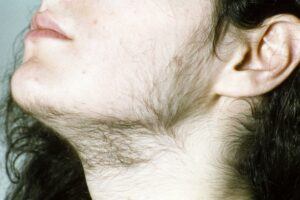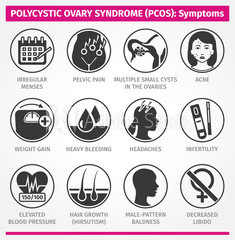“Hormone Imbalance | Hirsutism in Women” indicates that one common symptom of hormone imbalance in women is hirsutism. This is defined as male-pattern hair growth, superfluous hair growth, among other terms.
It is a major cause for concern and a stress point for most people who are afflicted with this condition.
The Endocrine System and Hirsutism
The endocrine system plays a key role in the production of hormones in the body. Each gland within its network is responsible for producing and secreting a different hormone into the blood stream. The bloodstream is their primary mode of transportation to carry out their functions. Different types of hormones regulate different body functions.
When reproductive hormones go off balance, and they sometimes do, one of the symptoms manifested is hair growth on the face (upper lip and chin), chest, and other parts of a woman’s body. These hairs are usually coarse and dark.

Testosterone and estrogen are the hormones predominantly responsible for reproduction in men and women respectively. An increase in testosterone in woman could manifest as irregular hair growth.
Hormone Imbalance | What Causes Irregularities?
 As much as we would like to have flawless bodies functioning perfectly, this is not commonly the case. Abnormailties, imperfections, and irregularities occur more often than we care for. These range from mild to severely extreme, sometimes leading to death.
As much as we would like to have flawless bodies functioning perfectly, this is not commonly the case. Abnormailties, imperfections, and irregularities occur more often than we care for. These range from mild to severely extreme, sometimes leading to death.
In the case of the reproductive glands, a common cause of hormone imbalance is polycystic ovary syndrome (PCOS). Cysts may or may not develop on the ovaries.
Other signs and symptoms include severe abdominal pain, irregular menstrual cycles, chronic acne, and weight gain. It is common for women diagnosed with diabetes and insulin resistance to be affected by PCOS. Sometimes there are no symptoms at all.
An endocrinologist can arrive at a diagnosis by doing a thorough examination, blood tests, and in some cases an ultrasound.
Chances of Reversal Are … | Possible?
Chances are, after being properly diagnosed by an endocrinologist, you have a treatment plan ready to turn things around. There is no guarantee of a specific outcome for the treatment of hormone imbalance. Each case is different; your story may be different from someone else’s.
Sometimes there are several things going on in your body at the same time. One thing affects the other, which may interfere with the progress of a treatment plan. External situations also play a role … financial insufficiency and other personal setbacks.
Overall, information is vital. There is a surplus of information, methodologies, devices, and products from many sources. Be diligent in finding the ones that are of value. Ask questions and draw on the support of family and friends.
Hormones Running Wild? | Fix It If You Can
The choices may be overwhelming, especially since there seems to be no easy fix. After you have all the information you need and have decided that there is a remedy you can rely on, go for it!
Remember, it may take longer than you expect to see the results you want. Get professional help to determine if a particular method is working or is a total waste of time. Bear in mind also that methods may have to be combined for better results.
One example of combined methods is in the case of electrolysis and laser hair removal. While laser may be the preferred method for you, it will have no effect on gray hairs. As a result, this may be combined with electrolysis. It is required that you shave before a laser treatment but not for electrolysis. Your specialist will advise you accordingly.
If you decide that these methods are not for you, here are some other choices:
- Shaving lasts about one to two days
- Tweezing is effective for a minimum of two weeks
- Waxing may last for a minimum of two weeks
- Electronic devices
- Topical creams
- Losing weight is essential, where applicable, and should be combined with any other method.
Hormone Imbalance | Beginning to End
So here’s the thing: The endocrine system plays a big role in the body. Its network of glands communicates with various organs in an attempt to maintain order. They produce hormones and secrete them into the bloodstream transporting them to where they are needed.
The reproductive hormones, testosterone and estrogen, regulate the functions of the reproductive organs but sometimes things go wrong. This results in hormone imbalance, which may lead to hirsutism.
There is a good chance that abnormal and excessive hair growth can be reduced or permanently removed. The road may be a long, tedious and stressful one … starting from the first thick, dark, unwelcomed strand of hair showing up in unexpected places.
Take time out to research and find the right solution. Don’t be afraid to ask questions … lots of them if that’s what it takes for you going in the right direction. Get the support you need to help you along your journey.
You may choose to combine methods for a better result. Work with your specialist to ensure you follow proper protocol for each. Regardless of which path you take, be sure to know the difference between what works and what is a total waste of time.
All hope is not lost. Through trial, error, and persistence, relief and peace of mind can be attained. Don’t quit!
I hope this short article has helped you in some way. There is a vast amount of information on the subject and related matter. This is just an introduction especially for those who are at a loss and need to be pointed in the right direction.
Feel free to leave your questions and comments below. I will do my best to address them.
Me on my part, I am hairy but I have never know anything like this before. But going through your post reminds me of a friend that has been going through thesame situation. I think I will go right ahead and share this with him so he can try out some of the methods.
Thank you for such an educative post.
Hi Yenge. Thank you. I’m happy that you find this post to be useful. Your friend, hopefully, will benefit from the information on this site. Thank you for your time.
Hi Veron, thanks a lot for sharing such an informative article. I must admit, I have few female friends with this problem of male pattern hair growth. I just never knew the correct name for it until today.
I am definitely fowarding this article to them. I am confident your article will be of immense help to them. Thank you!
Daniel, thank you for visiting my website, taking the time to read, and leave your comments. I really hope your friends will find the information useful.